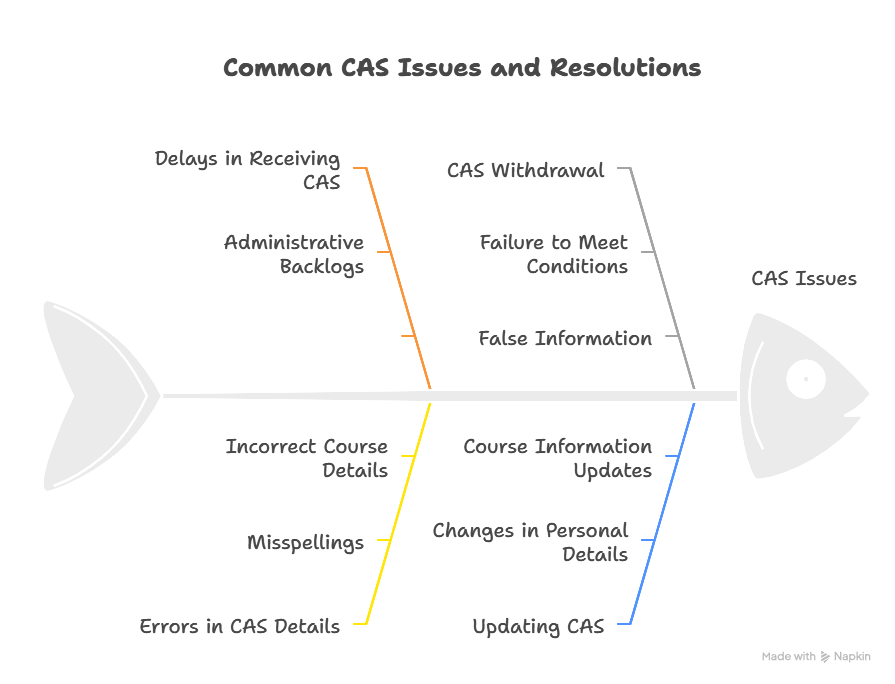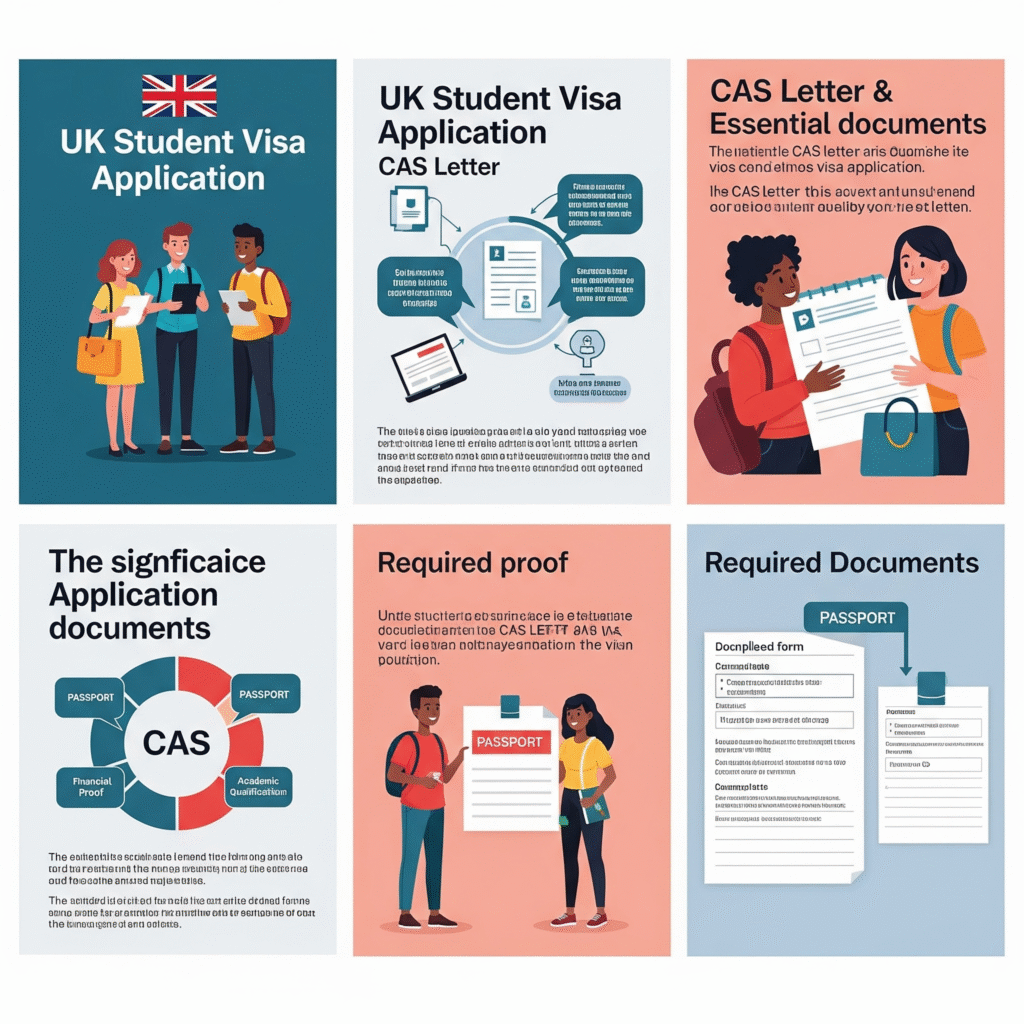Embarking on a study abroad journey in the United Kingdom presents an exciting academic prospect. However, this endeavor necessitates navigating several crucial administrative procedures, among which the Confirmation of Acceptance for Studies (CAS) stands as arguably the most pivotal document. The CAS is an electronic document issued by your chosen UK education provider that forms the cornerstone of your Student visa application. It serves as a prerequisite for obtaining a student visa. Without a valid CAS, an applicant simply cannot apply for a UK Student visa. This comprehensive guide aims to delineate the intricate details of the CAS process, offering essential insights for a streamlined visa application.
What Exactly is a CAS (Confirmation of Acceptance for Studies)?
The CAS is an electronic statement that encompasses vital information pertaining to the applicant and their chosen academic program, and it incorporates a unique ‘CAS number’. By issuing this document, the university formally agrees to act as the applicant’s Student Visa Sponsor.
Key Components of Your CAS Statement:
This critical document is replete with details indispensable for a successful visa application. A CAS statement typically contains the following information:
- Your 14-digit CAS reference number. This number is unique to each student and serves as a reference for UK Visas & Immigration (UKVI) to confirm that the applicant is a genuine international student enrolled in a UK academic institution.
- The University’s Sponsor License Number (SLN) and its address details.
- Your full name, date of birth, nationality, and passport number.
- Course details: Including the title, level of study (e.g., undergraduate or postgraduate), and, critically, the start and end dates.
- Financial information: Specifically, tuition fees for the first academic year (or the entire course fee, including scholarships if applicable) and any tuition or accommodation fees you have already paid to date.
- Additional details: Such as ATAS requirements (Academic Technology Approval Scheme) and details of previous UK study. Scores from English language proficiency tests (like IELTS) are also included.
Why the CAS is Critical for Your UK Student Visa Journey
The CAS holds an indispensable position in the UK student visa application framework.
- The Absolute Mandate: An applicant cannot make a Student Visa application without a CAS. It is a legal requirement to prove that an applicant has secured a place at a recognized educational institution.
- Verification of Admission: The CAS serves as a guarantee from the university that the applicant has been genuinely accepted for a course of study. The unique CAS number enables UK Visas & Immigration (UKVI) to cross-reference the applicant’s personal and course-specific details on secure databases shared with the university. This verification process ensures that all student visa applicants are genuine and have a legitimate reason for studying in the UK.
- CAS vs. Offer Letter: While an offer letter is an initial document from the university confirming admission, the CAS is the formal electronic document specifically required for your visa application. The CAS includes additional details pertinent to the visa process, making it a crucial document beyond the initial offer letter.
Your Step-by-Step Guide to Obtaining a CAS Letter
The process of obtaining a CAS letter involves several structured steps, typically managed through an online platform provided by the university.
- 1. Meet Eligibility Criteria and Accept Your Offer:
- Applicants must have received and formally accepted an offer of admission from a UK educational institution. This offer should ideally be unconditional.
- Applicants must also meet all academic qualifications required for their course and demonstrate the financial means to support themselves during their studies, covering tuition fees and living expenses. For postgraduate programs, a relevant undergraduate degree is required, and evidence of work experience or research may be necessary.
- 2. Pay Any Required Deposits:
- Most universities require an initial deposit payment to secure a place before issuing a CAS. For example, The University of Law requires an acceptance fee of £8,000, which is subsequently deducted from the total course fees.
- Important Note: Some universities, particularly for undergraduate programs, may not require an initial deposit for the CAS.
- 3. Access CAS Shield and Submit Documents:
- Upon accepting the offer and paying the deposit (if applicable), the university will typically send a CAS Shield invitation by email. This is an online self-service system designed to facilitate the upload of vital information and documents. Access to CAS Shield is usually granted once an unconditional offer has been accepted and the acceptance fee paid.
- Key Documents to Upload:
- Personal Identification: A valid passport and other identification details. The passport should be valid for the duration of the course.
- Academic Records: Official transcripts, certificates, and marksheets demonstrating previous academic achievements and meeting entry requirements.
- Proof of English Proficiency: Results from recognized language tests like IELTS or TOEFL.
- Financial Evidence: Documents demonstrating sufficient funds to cover tuition and living expenses (e.g., bank statements, sponsorship letters, or financial affidavits).
- 4. Crucial: Check Auto-Populated Information for Accuracy:
- CAS Shield will auto-populate information about the applicant and their program. It is “very important that all of the information is accurate”, as errors or inconsistencies can result in a student visa request being denied.
- Action: Double-check every detail. If any information is incorrect, immediately contact the university’s Visa Compliance Team or CAS Team to request corrections. Provide supporting documentation (e.g., passport).
- 5. University Assessment & Qualification Checks:
- The university will review submitted documents and assess eligibility for Student visa sponsorship, ensuring compliance with Home Office regulations. This includes checking financial evidence to ensure it meets Home Office requirements before issuing the CAS.
- Some universities, such as The University of Law, may conduct qualification checks through partners. Consent for these checks may be required promptly, often within 24 hours to avoid delays.
- 6. Receive Your CAS Statement:
- Once all requirements are met and assessments completed, the university will send your CAS statement by email, containing your unique CAS number and other visa application information.
- Action: Once the CAS is received, applicants should apply for their visa as soon as possible.
Key Requirements and Considerations
Beyond the sequential steps, two critical aspects warrant specific attention in the CAS process.
- Pre-CAS / Compliance Interviews:
- Purpose: Many UK universities conduct these online interviews, sometimes via platforms like CAS Shield, to assess an applicant’s “genuine intentions to study in the UK” and confirm compliance with visa requirements. These interviews typically cover study plans, background, finances, and career aspirations.
- Preparation: Applicants must “demonstrate strong knowledge of your chosen programme and the University” and have “clear motivations for studying in the UK”. Careful research and consideration of these factors in advance are highly recommended.
- Timing: It is advised to prepare for and sit the interview at the earliest opportunity, ideally at least one week before the course acceptance deadline. Early application may allow for multiple attempts at passing the interview.
- Financial Evidence – The Crucial “28-Day Rule”:
- While the university checks financial evidence for CAS issuance, it is paramount for the visa application itself to understand the “28-day rule.” This rule dictates that bank statements must show that the applicant has held the required amount of money for at least 28 consecutive days before the UK student visa application is submitted. This ensures that sufficient funds are available to cover tuition fees and living expenses. You must provide financial documents when requesting a CAS and during your visa application.
Important Timelines and Validity
Understanding the validity period and deadlines associated with the CAS is crucial for timely visa application.
- CAS Validity: A CAS letter is valid for six months from its issue date. It can typically be utilized up to three months before your course of study begins. If unused for a visa application within six months, it expires.
- University Deadlines for Issuance: Universities, such as the University of Greenwich, establish specific CAS issue deadlines that may vary by country of domicile. These deadlines are designed to ensure applicants have adequate time to process their visa. Missing these deadlines can directly impact an applicant’s ability to apply for their visa.
- Applying for Your CAS: It is generally considered “a safe practice to apply for your CAS letter as early as possible”. While processing time varies (typically 1 to 4 weeks after meeting all requirements), early submission can lead to a quicker response.
- Post-CAS Visa Application: Once the CAS is obtained, applicants “should apply for their visa as soon as possible”.
- Arrival in the UK: Applicants can arrive in the UK up to one month before their program starts. Universities often encourage early arrival to facilitate participation in welcome activities and to avoid missing initial classes.
Common Issues and How to Resolve Them
Despite careful planning, issues may arise during the CAS process. Understanding common problems and their resolutions is vital.

- 1. Delays in Receiving Your CAS:
- Reasons: Common causes include administrative backlogs at the university, incomplete application documents, or challenges in verifying academic or financial credentials.
- Action: Immediately contact your university’s admissions or international office (e.g., the University of Greenwich’s International Office or CAS Team). Regularly check your application status using any online tracking tools provided, such as CAS Shield. Ensure all required documents have been submitted and that there are no outstanding issues.
- 2. Errors in CAS Details:
- Common Errors: These include misspellings of names, incorrect course details, or inaccurate start/end dates.
- Implications: Such errors can lead to delays or potential refusal of a visa if the information does not match other submitted documents or visa requirements.
- Action: Carefully review your CAS statement upon receipt. If any information is incorrect, “write to our Visa Compliance Team immediately” or contact the university’s relevant department. Provide supporting documentation for corrections, such as your passport or previous academic records.
- 3. CAS Withdrawal or Cancellation by the University:
- While a CAS letter itself cannot be rejected by the UKVI, it can be withdrawn or cancelled by the university.
- Reasons: This may occur if an applicant fails to meet university conditions (e.g., academic requirements), fails to provide required documentation, or provides false information.
- Consequences: Such issues can delay study plans, impact financial investments, and may necessitate reapplying.
- 4. Updating or Changing Your CAS:
- Scenarios Requiring Updates: Updates are necessary for changes to personal details (e.g., name, passport number, contact details), course information (e.g., start/end dates, course title), or even if you change universities. A new CAS may be required if you defer your course or extend your studies.
- Process: Contact your university promptly to inform them of the changes and follow their procedure for requesting an update. This might involve filling out a specific form or could lead to the issuance of a new CAS.
- Impact: Changes can lead to visa application adjustments and potential delays. If a visa has already been submitted, the UK Home Office may need to be informed of the new CAS details. Timely updates are critical to minimize delays.
- 5. Lost CAS Number: If an applicant loses their CAS reference number, they should simply contact their university to retrieve it.
CAS and Visa Refusals – What You Need to Know
It is crucial to understand that while a CAS is essential, it does not guarantee a UK student visa.
- No Visa Guarantee: A CAS letter does not guarantee a UK student visa. The final decision depends on various factors.
- Reasons for Rejection (Even with CAS): Visa rejection can occur due to issues with financial evidence, inconsistencies in the application, or failure to meet other visa requirements. “Errors or discrepancies in your CAS”, such as incorrect personal information or outdated course details, can directly “result in visa refusals”. Inaccurate or missing information can raise concerns regarding the authenticity of the application.
- Preventive Measures:
- Verify Information: Ensure all details in your CAS are accurate and meticulously match information in your other documents, such as your passport and financial statements.
- Submit Complete Documents: Provide all required documentation along with your visa application, including your CAS, proof of funds, academic records, and any additional documents requested by the Home Office.
- Regular Follow-Up: Regularly check the status of both your CAS and visa application, addressing any issues or discrepancies promptly with your university or the Home Office.
- Consult with Experts: If significant issues or concerns arise with your CAS or visa application, consider consulting with a visa expert or immigration advisor for guidance.
- Stay Informed: Remain updated on the latest visa regulations and requirements, as the UK visa process can be subject to changes.
Understanding and diligently adhering to the CAS process is paramount for a successful UK student visa application. Thorough preparation and prompt action are key to navigating this essential step effectively.









